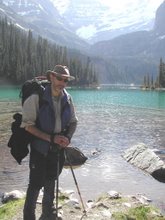We’ve had serious flooding
up here in Muskoka and the Almaguin Highlands, as has much of Northeastern
Canada. The perfect storm of melting
snow, warmer weather, and heavy rains have combined to cause waterways to swell
in the local area. To compound the
problems, there is more heavy rain in the forecast for later this week. The
problem is widespread, with swollen rivers, overflowing dams, and damaged
infrastructure impacting communities in many of the eastern provinces. Some in
our community have already lost their homes, many are without power, and phone
lines in Katrine have been shut down indefinitely until the water subsides.
Nearby Bracebrige seems to have been hardest hit, and the damage has been
devastating to that community. Last Friday afternoon, I attended a meeting at
the Katrine Community Centre to hear what our Reeve and representatives from volunteer
fire department, the police, and The Red Cross had to say about the flooding
which has so far impacted our community. As it turns out, not much can be done, at
least until the water recedes. First responders face an increasingly difficult job
as some roadways become impassable, and the weather has not been particularly cooperative.
Near us, those living along the
Magnetawan River here in Katrine were hardest hit, and many people have recently
been evacuated. I rode my ATV over to nearby Horseshoe Lane, a crescent that
runs along the river, and it was completely underwater. Shortly thereafter, the
main road into Katrine became impassable and was closed. One of the residents on Horseshoe
Lane is an elderly friend of mine named Ed. I called him up last week to see if
he was okay, and he said that he and his dog Sadie were all right for the time
being, but that he was ready to evacuate if he had to. He’d already lost most
of the equipment in his garage, and the water was creeping up to his house. Ed
is a stubborn son of a gun, and he was going to wait it out as long as he
could. I saw him at the community center meeting last Friday afternoon, and he
came up to me afterwards to recount what happened shortly after I’d called him.
As I suspected, he had to evacuate quickly, which in and of itself is
nerve-racking. As he loaded his dog into his canoe, so he could paddle out to
his car on dry land, the dog got spooked, and as he was trying to catch the
dog, the canoe capsized. My 78 year-old friend and his dog were tossed into the
freezing cold water. This was not exactly what he’d planned. He laughed it off
and said he just grabbed a bar of soap and had a bath.
It is not uncommon for
us to experience mild flooding along our lake, as the spring melt swells local
rivers, but this is, according to long time residents of this area, the worst
it has been in over 30 years. I gauge the water level by watching our retractable
dock sinking into the lake, and presently the fulcrum of the dock, usually four
feet above the water level, is now well over a foot underwater. I’ve never seen
flooding this bad in our area. The other day I watched a neighbor’s front
porch, complete with barbecue, float by. Still this is nothing compared to what
others are experiencing. The ground is saturated, there is more rain coming, and
what is to be done when there is simply too much water?
When a dike broke in
Ste-Marthe-sur-le-Lac, Quebec, 6500 residents had to be evacuated to higher
ground. In the nation’s capital, and nearby Gatineau Quebec, the swollen Ottawa
River has prompted evacuations and forced bridge closures. There is major
flooding in the Maritimes as well. If this is the new norm, then we’d better
start to prepare for it. Already I’m hearing a lot of talk about government requiring
flood victims to move to higher ground as a prerequisite for flood relief. That will
be a hard sell. I wonder if there isn’t
a way to divert water away to man-made reservoirs during these flooding
scenarios, but I suspect that would be too expensive. Maybe, as fresh water becomes
a more precious commodity, it will pay to pipe it to more arid regions that need water. A
friend of mine, presently studying to be an architect, pointed out that my
idea, while interesting, would be impractical, given the infrequency of floods.
Perhaps that is true now, but what about
when the polar ice cap melts. Hey, I know about as much about climate science
as Donald Trump knows about diplomacy.
Fires, floods, ignorant, hateful cowards shooting up places of
worship; maybe these are messages from above. Perhaps when frogs start to rain down from the sky, then we willl begin to take notice.
Written by Jamie Oppenheimer c 2019 ALL RIGHTS
RESERVED



No comments:
Post a Comment